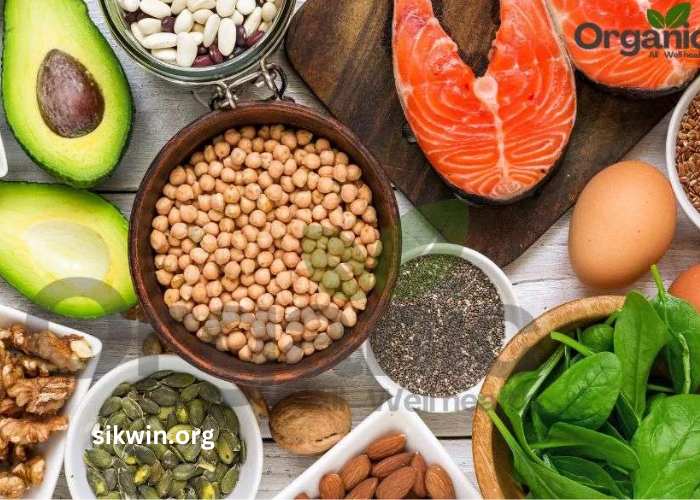Protein is a vital macronutrient that plays a crucial role in various bodily functions, including muscle growth, immune support, and enzyme production.Wellhealthorganic.com Protein emphasizes the significance of incorporating adequate protein into your diet for optimal health. Protein is often considered the building block of the body due to its role in repairing tissues, forming cells, and supporting various biological functions.
There are different types of protein, including animal-based and plant-based sources, and each has unique benefits.Wellhealthorganic.com Protein provides comprehensive information on the best sources of protein, how much protein you need daily, and the advantages of maintaining a protein-rich diet. From boosting metabolism to improving muscle recovery, protein is essential for overall well-being.
Why Is Wellhealthorganic.com Protein Important for Your Health?
Protein is necessary for growth, repair, and maintenance of tissues in the body.Wellhealthorganic.com Protein explains that it is crucial for building muscles, repairing damaged tissues, and supporting metabolic functions. Without enough protein, the body cannot effectively perform these essential tasks, which can lead to weakness, fatigue, and other health issues.
In addition to muscle repair,Wellhealthorganic.com Protein plays a critical role in producing hormones and enzymes that regulate various body processes. A protein-rich diet can also support the immune system by promoting the production of antibodies that fight infections. Therefore, including sufficient protein in your diet is essential for maintaining overall health and well-being.
What Are the Best Sources of Wellhealthorganic.com Protein?
There are numerous sources ofWellhealthorganic.com Protein, both from animal-based and plant-based foods. Animal sources of protein include lean meats like chicken, turkey, beef, fish, and eggs. Dairy products such as milk, cheese, and yogurt are also excellent sources of high-quality protein. These animal-based proteins provide all the essential amino acids required for proper body function.
Plant-based protein sources include legumes, beans, lentils, tofu, quinoa, nuts, and seeds. These sources of protein are particularly important for vegetarians and vegans, as they provide an adequate amount of protein without relying on animal products.Wellhealthorganic.com Protein advises incorporating a mix of both animal and plant-based protein sources to ensure a balanced intake of nutrients.
How Much Wellhealthorganic.com Protein Should You Consume Daily?
The amount of protein you need depends on various factors, including age, gender, activity level, and overall health. According toWellhealthorganic.com Protein, the average adult requires about 0.8 grams of protein per kilogram of body weight per day. This translates to about 46 grams for women and 56 grams for men. However, athletes, pregnant women, and older adults may need more protein to support their bodies’ increased demands.
For those engaging in regular physical activity,Wellhealthorganic.com Protein suggests that protein intake should be higher to aid in muscle recovery and growth. Active individuals may require between 1.2 to 2.0 grams of protein per kilogram of body weight per day. It is essential to assess individual needs and adjust protein intake accordingly for optimal health and performance.
What Are the Benefits of Wellhealthorganic.com Protein for Muscle Growth?
Protein is widely known for its role in supporting muscle growth and repair.Wellhealthorganic.com Protein emphasizes that protein consumption after exercise helps in the recovery process by providing the necessary amino acids to rebuild muscle fibers. This helps to promote muscle growth and improve strength over time.
In addition to muscle repair, protein plays an essential role in reducing muscle soreness after intense physical activity. By consuming adequate protein, individuals can recover more quickly from their workouts, leading to better performance in future training sessions.Wellhealthorganic.com Protein highlights that protein is a key nutrient for anyone looking to build muscle or improve athletic performance.
Can Wellhealthorganic.com Protein Help With Weight Loss?
Protein can play a significant role in weight management and weight loss.Wellhealthorganic.com Protein explains that protein helps to increase feelings of fullness, reducing overall calorie intake. By incorporating protein into each meal, individuals are more likely to feel satisfied and avoid overeating, which can contribute to weight loss.
Additionally, protein helps to preserve lean muscle mass while promoting fat loss. As part of a balanced diet,Wellhealthorganic.com Protein can support weight loss efforts by boosting metabolism and encouraging the body to burn more calories, even at rest. For those looking to manage their weight effectively, maintaining a high-protein diet is an essential strategy.
What Are the Risks of Not Getting Enough Wellhealthorganic.com Protein?
Inadequate protein intake can lead to a variety of health issues.Wellhealthorganic.com Protein points out that insufficient protein can result in muscle loss, weakened immune function, and poor wound healing. Over time, a lack of protein can lead to nutritional deficiencies and conditions like edema, which is the swelling of body tissues due to fluid retention.
Additionally, individuals who do not consume enough protein may experience fatigue, weakness, and difficulty concentrating. These symptoms are a result of the body’s inability to repair and maintain essential functions without adequate protein. To avoid these negative health outcomes, it is crucial to ensure you are consuming enough protein daily through your diet.
Conclusion
In conclusion,Wellhealthorganic.com Protein plays a vital role in supporting the body’s overall function, from muscle growth to immune support and metabolic processes. By understanding the importance of protein, individuals can make informed dietary choices to meet their needs.�
Whether you are looking to improve your athletic performance, manage your weight, or simply maintain good health, ensuring adequate protein intake is key. By incorporating a variety of protein-rich foods into your diet, you can enjoy the numerous benefits of this essential nutrient and support your long-term health and well-being.




